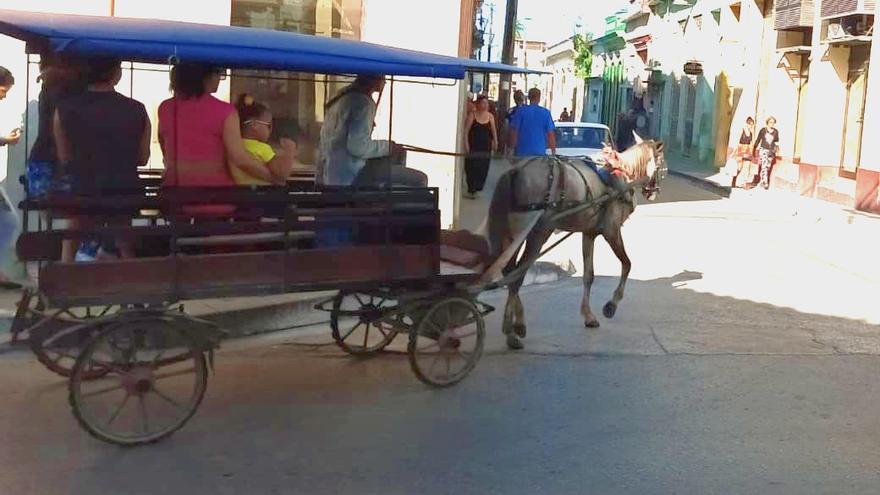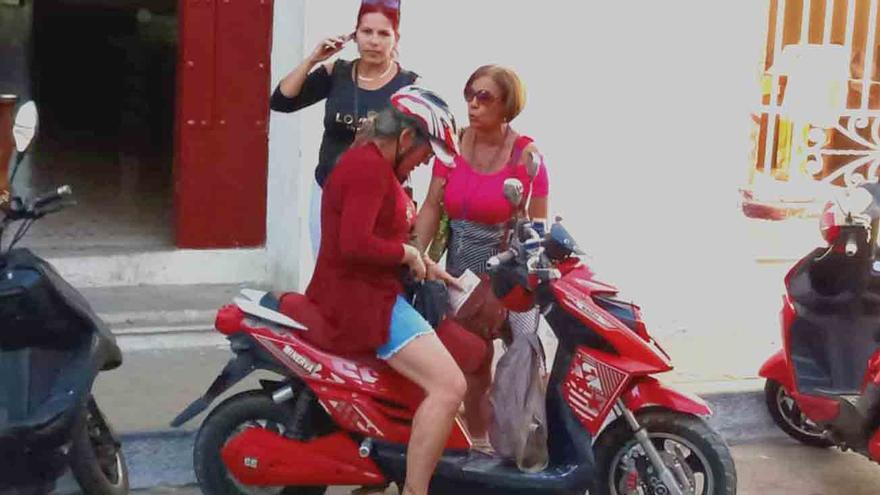
![]() 14ymedio, Yankiel Gutiérrez Faife, Camajuaní, 9 April 2023 — Jinaguayabo is near the sea. To the north are the luxurious keys of Villa Clara; to the south, Remedios, at the end of a run-down road, where the horse carts circulate, at a slow pace and under the sun. It is a poor, rural town, with fewer than 700 inhabitants and from which everyone ends up leaving. In such an isolated enclave, the cart drivers maintain the indispensable link with the neighboring towns, but their routes, usually quiet, are now infested with assailants.
14ymedio, Yankiel Gutiérrez Faife, Camajuaní, 9 April 2023 — Jinaguayabo is near the sea. To the north are the luxurious keys of Villa Clara; to the south, Remedios, at the end of a run-down road, where the horse carts circulate, at a slow pace and under the sun. It is a poor, rural town, with fewer than 700 inhabitants and from which everyone ends up leaving. In such an isolated enclave, the cart drivers maintain the indispensable link with the neighboring towns, but their routes, usually quiet, are now infested with assailants.
Gerónimo, who owns a passenger cart, leaves for work at seven in the morning. “At that time it’s easy,” he explains to 14ymedio. “It’s when the people of Jinaguayabo travel to Remedios, to study or to work. Then I have another route to bring them back, from three to seven at night, when they return to town.”
Several weeks ago, he says, he found three people waiting on the side of the road, and they asked him for a ride to Remedios. They got into the cart, two in the back seat and one next to him. “When we were coming to the bridge, the one behind me put a belt around my neck and forced me to park in a ditch,” says Gerónimo, who immediately obeyed his attacker.
The others were in charge of checking his pockets: they took his phone, some bluetooth headphones, his watch and the proceeds of the day, 2,500 pesos [$100]. “At least they left me the horse and the cart,” he says with some relief. “Now I have to see if I can buy what I lost again, because the police are not going to find the thieves.”
Despite the isolation and poverty, Jinaguayabo has always been close to the most tense events in Cuba. Located near the first settlement of the Spanish conquistadores in Villa Clara, besieged by corsairs and pirates and centuries later by insurgents, the town has not been oblivious to violence. However, its inhabitants complain that the atmosphere is electric, and they feel afraid being on any road at night.
“You can no longer go by bike to Remedios, as before,” complains Daivel, a 19-year-old whose parents have banned him from traveling at night the three miles that separate Jinaguayabo from the so-called “eighth village” of the Island. “I used to pedal there on weekends, but now they won’t let me go for fear that something will happen to me along the way. If I go to Remedios, I have to sleep with friends and come back in the morning,” he says.
The situation is repeated in other rural towns, such as Taguayabón — to the west, between Remedios and Camajuaní — where thieves prey on people during the November carnivals. At two in the morning, when everyone is drunk and their senses dulled in the dark, it is easy for bandits to take a wallet or watch, or to corner a clueless villager.
They also manage to force the doors to houses, which are less protected because, as Maria points out, “in the countryside everyone knows each other.” She and her husband returned from the festivities in the early morning and discovered a broken window in their home. Inside, she says, “everything was a disaster. They had taken a cell phone and cash, which I had hidden in the closet.”
Crime is so widespread that you can no longer trust even the workers you hire. Daniela, a housewife from Remedios, hired a bricklayer known by the family, 26-years-old, to change the tiles and the sink in the kitchen. “He came to work for a single day and didn’t finish. He told me that he had a fever and a cold,” she says. That same night she was robbed of a powerful LED light that she had in the yard. “My husband, who knew that the boy was in bad company, went to his house. He himself had stolen the lamp, taking advantage of the fact that he knew the house, and exhibited it very brazenly in his yard,” the woman says.
In the marginal areas of the cities or in the rural towns the situation is unacceptable, but it is even more serious in the homes of the farmers. Francisco, a guajiro whose farm is in the vicinity of Rosalía, near Taguayabón, had two oxen with which he worked on his plot.
After working and taking a bath, Francisco used to have lunch and take a nap, while the animals grazed near the house. “In short,” he says, “when I was sleeping very peacefully, the bandits had been ’paying attention’ to me for many days and knew my routine. They had studied me.” At nightfall, he saw that the oxen had disappeared.
A television program funded as propaganda by the Ministry of the Interior, “Behind the Footprint”, shows a police squad that quickly solves criminal cases. “But real life is not like that,” says Francisco, who didn’t wait for the authorities to take action on the matter.
Some neighbors helped him organize a search party, and they found a broken fence and tracks. Beyond, near the town of Palenque, they discovered a scrub where the drunken thieves were butchering the animals. The second ox, tied to the fence, tried in vain to free itself.
“We caught three thieves and the police took them,” says Francisco. “But they have already freed one of them. Usually they are released for lack of interest in the investigation, or the police don’t even bother to come.”

No one is safe. Not even in the center of big cities like Santa Clara. Ernesto, owner of a motorcycle repair shop not far from Etecsa’s offices — just one block from Vidal Park — was robbed of one of the vehicles he had in the warehouse at nine at night, while his family was watching the telenovela.
The thief broke the fiber cement roof of the workshop and took a motorcycle with just two and a half years of use, which needed paint and a new battery. However, he did not realize that Ernesto had installed cameras and did not have his face covered. “It wasn’t difficult to identify him,” he says. “A week later, the police caught the thief and recovered the motorcycle. However, I know I was lucky.”
Translated by Regina Anavy
____________
COLLABORATE WITH OUR WORK: The 14ymedio team is committed to practicing serious journalism that reflects Cuba’s reality in all its depth. Thank you for joining us on this long journey. We invite you to continue supporting us by becoming a member of 14ymedio now. Together we can continue transforming journalism in Cuba.
